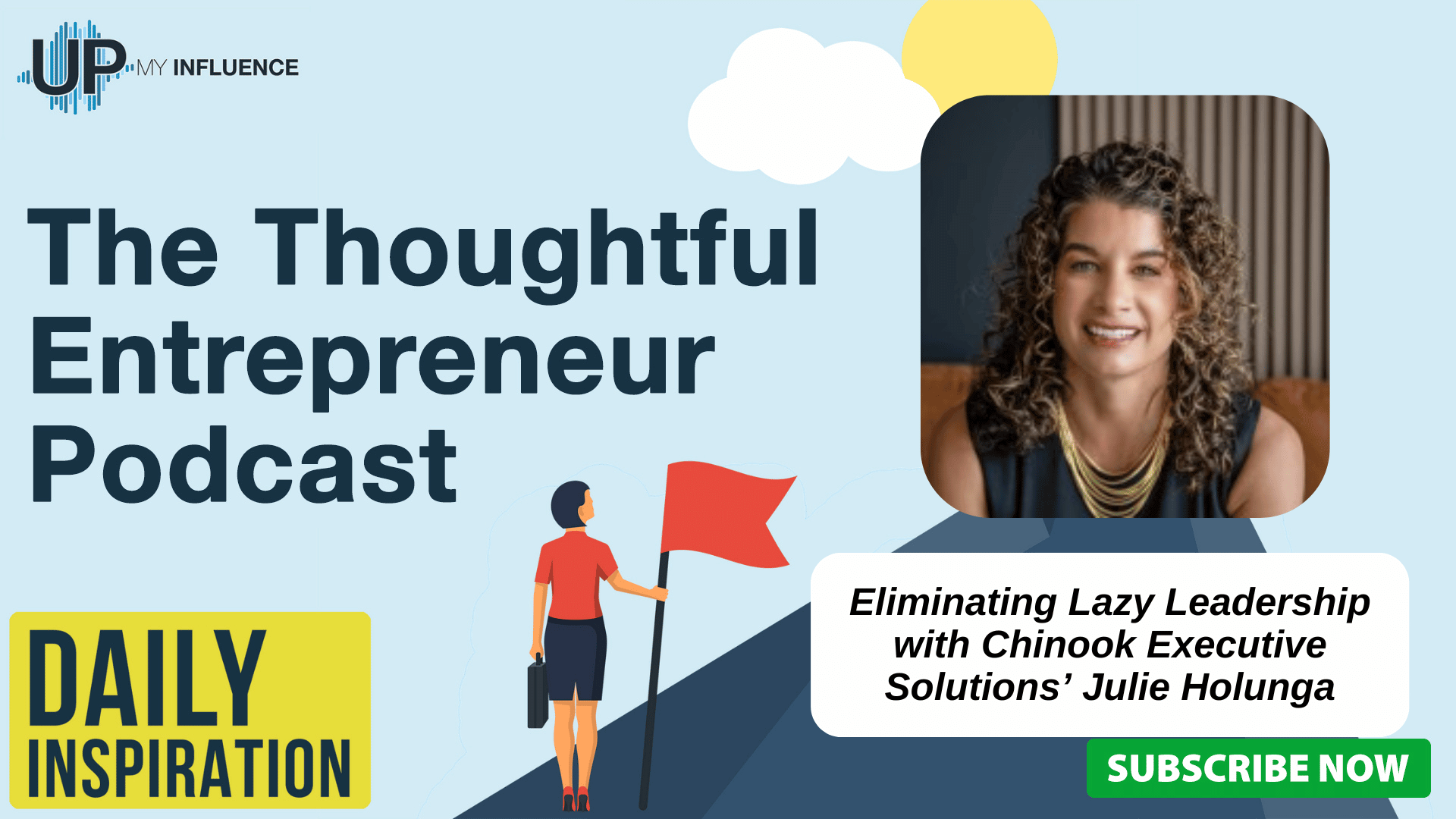THE THOUGHTFUL ENTREPRENEUR PODCAST
 Transforming and Understanding Lazy Leadership
Transforming and Understanding Lazy Leadership
In a recent episode of “The Thoughtful Entrepreneur Show,” host Josh engaged in a compelling conversation with Holunga, a distinguished leadership trainer, TEDx speaker, coach, and author. As the principal and executive coach at Chinook Executive Solutions, Julie is dedicated to eradicating lazy leadership and promoting impactful leadership practices. This blog post explores the key themes and actionable insights from their discussion, offering valuable guidance for leaders and organizations aiming for excellence.
Lazy leadership, as defined by Julie, refers to a lack of proactive, engaged, and effective leadership. It can manifest in several ways, such as micromanagement, lack of vision, and poor communication. These behaviors can lead to decreased employee morale, reduced productivity, and high turnover rates, as employees feel undervalued and unmotivated. Julie's approach to combating lazy leadership involves fostering self-awareness, developing emotional intelligence, and ensuring clear vision and communication within organizations.
Julie’s comprehensive leadership training is tailored to meet the unique needs of each leader and organization. Her methodology emphasizes self-awareness and reflection, developing emotional intelligence, and empowering and delegating tasks effectively. By promoting continuous learning and development, Julie helps leaders stay relevant and effective. Her services include one-on-one coaching, workshops, training programs, and a wealth of online resources. For those seeking to elevate their leadership skills, Julie’s programs offer invaluable support and guidance.
About Julie Holunga:
Julie Holunga is a Leadership Trainer and Executive Coach developing professionals to amplify their influence and impact. She works with Attorneys, CPAs, and Business Leaders, with an expertise in the careers of female professionals. Julie’s clients excelled in their careers with her proven communication strategies, honed their leadership skills, built increased visibility, and heightened confidence. Julie works with highly driven teams to instill the Trusted Voice Paradigm to develop collaborative patterns that deliver value. Through these programs, leaders learn to get out of their own way, develop trusting relationships with key stakeholders, and have a positive impact on the organization's bottom line.
Prior to starting her own consulting practice, Julie served as Project Manager for Alumni Career Services at Harvard Business School, where she focused on advancing the careers of female alumni. She worked with F500 companies to retain and advance women into positions of leadership. Julie is one of thirty Global Master Trainers with Emergenetics®, teaching leaders, teams, and global organizations to align their communication for positive impact. Julie gave her first TEDx Talk in 2020: Don't Let Your Words Sabotage Your Career. She is a contributing author to the leadership book for women, On the Rise.
Julie earned her BA at Union College and her MBA at Boston College. She spent seven years living and attending school in France, India, and Hong Kong. Julie and her family moved from Boston to Calgary, Canada, and are now settled in the beautiful foothills of Denver.
About Chinook Executive Solutions:
Chinook Executive Solutions is a Denver-based training and coaching firm serving mid-career attorneys, CPAs, and female business leaders.
We help ambitious professionals reduce stress, manage their time, lead with confidence, and build their businesses.
Apply to be a Guest on The Thoughtful Entrepreneur: https://go.upmyinfluence.com/podcast-guest
Links Mentioned in this Episode:
Want to learn more? Check out Julie Holunga's website at https://www.julieholunga.com/
Check out Chinook Executive Solutions on LinkedIn at https://www.linkedin.com/company/chinook-executive-solutions
Check out Julie Holunga on LinkedIn at https://www.linkedin.com/in/julieholunga
Don’t forget to subscribe to The Thoughtful Entrepreneur and thank you for listening. Tune in next time!
More from UpMyInfluence:
We are actively booking guests for our The Thoughtful Entrepreneur. Schedule HERE.
Are you a 6-figure consultant? I’ve got high-level intros for you. Learn more here.
What is your #1 Lead Generation BLOCKER? Take my free quiz here.
Want to learn more about all the podcasts managed by UpMyInfluence? Opt in here.


